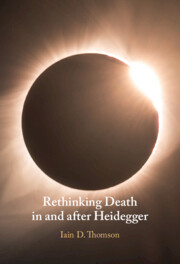Book contents
- Rethinking Death in and after Heidegger
- Rethinking Death in and after Heidegger
- Copyright page
- Dedication
- Contents
- Preface
- Acknowledgments
- A Note on the Notes (da capo)
- Abbreviations Used for Works by Heidegger
- Part I Rethinking Death in Heidegger
- Part II Rethinking Death after Heidegger
- References
- Index
- References
References
Published online by Cambridge University Press: 18 December 2024
- Rethinking Death in and after Heidegger
- Rethinking Death in and after Heidegger
- Copyright page
- Dedication
- Contents
- Preface
- Acknowledgments
- A Note on the Notes (da capo)
- Abbreviations Used for Works by Heidegger
- Part I Rethinking Death in Heidegger
- Part II Rethinking Death after Heidegger
- References
- Index
- References
- Type
- Chapter
- Information
- Rethinking Death in and after Heidegger , pp. 305 - 316Publisher: Cambridge University PressPrint publication year: 2024

